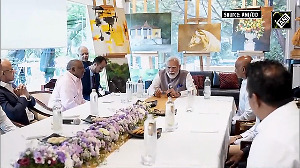By now you already know about the Finance Minister P Chidambarm's move to impose a cash transaction tax of 0.1 per cent on withdrawals from banks or ATMs in excess of Rs 10,000.
If you like sealing most of your deals in cash, the finance minister has just made life a bit tougher for you.
As part of measures to curb tax evasion and black money transactions, the finance minister has imposed a cash transaction tax of 0.1 per cent on amounts in excess of Rs 10,000 that's withdrawn from bank accounts on the same day.
This means you have to pay Rs 10 for every Rs 10,000 you withdraw. To avoid this, you will have to become a serial withdrawer over days to raise sums larger than Rs 10,000.
The tax will apply to four kinds of banking transactions:
- Withdrawals exceeding Rs 10,000 by a person from any scheduled bank on a single day.
- Purchase of a bank draft, banker's cheque or any other financial instrument on payment of cash exceeding Rs 10,000. The tax is payable by the purchaser.
- Receipt of cash on encashment of term deposits, even on maturity.
- Cash withdrawals exceeding Rs 10,000 by way of bearer cheques, which will be payable by the bearer.
Bankers say this tax will push people to use their debit and credit cards more often, but cards often are not accepted for many high-value transactions.
Vendors of durables do sometimes accept cards for transactions, but card issues tend to levy high charges, which again pushes customers to opt for cash.
Most hospitals and educational institutes also do not accept cards or cheques as payment/fees and cash is the only option. Therefore, one may have to start budgeting for cash transaction tax in these cases.








 © 2025
© 2025